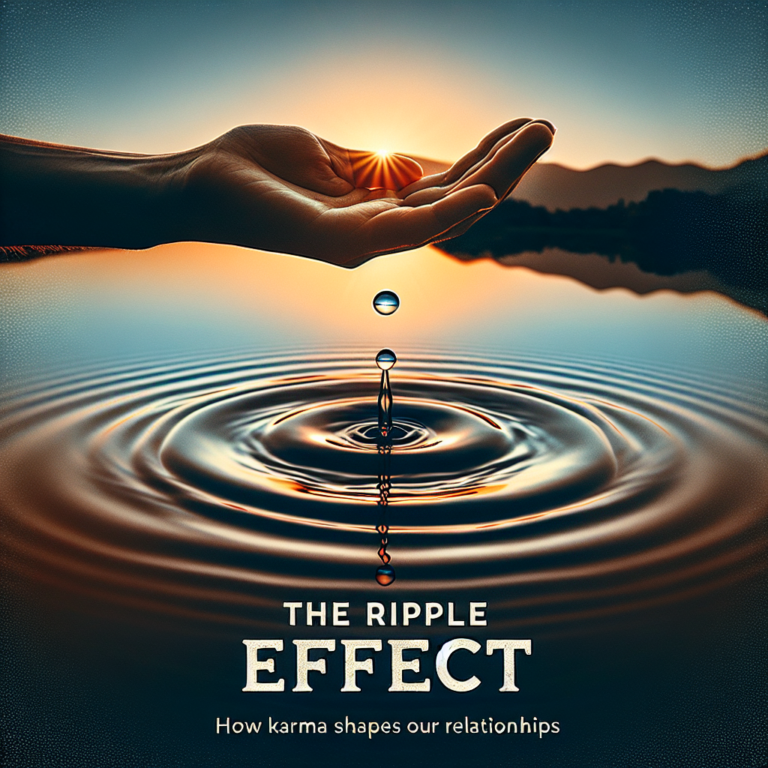Karma and Forgiveness: How Letting Go Shapes Our Destiny
In the tapestry of human experience, the concepts of karma and forgiveness stand out as powerful threads that weave our lives together, imparting both meaning and direction. Karma, rooted in ancient Eastern philosophies and often misunderstood in the modern context, speaks to the idea that our actions create ripples in the fabric of reality. Much like the laws of physics, these ripples return to us, often in ways we least expect. Forgiveness, on the other hand, is the liberating act of releasing negativity—both towards others and ourselves. Delving into the interplay of karma and forgiveness can illuminate how letting go not only impacts our relationships but also profoundly shapes our destiny and personal growth.
The Essence of Karma
Karma, a concept derived from the Sanskrit word "karman," meaning "action," refers to the spiritual principle of cause and effect. In various cultures across the globe, karma suggests that every action has consequences—good actions lead to positive outcomes, while harmful deeds sow the seeds of suffering. However, karma is not a system of reward and punishment; rather, it’s a moral compass guiding us toward accountability and growth.
The complexity of karma is often reflected in our interactions with others. Each moment presents an opportunity to choose actions that align with our values or to succumb to fear and resentment. The law of karma challenges us to take responsibility for those choices, aligning with the belief that the energies we send out invariably find their way back to us.
The Power of Forgiveness
Forgiveness is an essential component of the human experience, yet it is often one of the most challenging aspects of our emotional life. To forgive is to relinquish the attachment to past grievances and injuries. It is an act that can be deeply personal as well as beneficial to our collective existence.
Forgiveness does not imply condoning harmful behavior; rather, it recognizes our humanity—the imperfections that make us who we are. Letting go of resentment allows us to heal and move forward, unburdened by the weight of negative emotions. Furthermore, forgiveness creates emotional space within us and encourages personal empowerment. By choosing to forgive, we reclaim our power and redefine our destiny.
The Interplay Between Karma and Forgiveness
Understanding that our actions reverberate back to us through karma can serve as a gentle prompt to embrace forgiveness. When we harbor resentment or foster grudges, we may inadvertently tie ourselves to the cycle of negativity, rerouting the energy back to us. In this way, forgiveness can be viewed as a mechanism for purifying our karma, allowing us to release negative energy that we might otherwise perpetuate.
Let’s consider a practical example: a person who has been wronged might feel a natural inclination to resist forgiveness, believing that holding onto their anger is a way to assert their worth. However, this resistance tends to exacerbate feelings of bitterness, locking them in a cycle of suffering. By choosing to forgive, not only do they liberate themselves from self-imposed bondage, they also break the cycle of harmful energy, fostering a more positive karmic path.
The Transformative Nature of Letting Go
Letting go is often easier said than done. It requires introspection, resilience, and a willingness to embrace vulnerability. However, the transformative power of this act cannot be overstated. In letting go, we open ourselves up to new possibilities, allowing our destiny to unfold unimpeded by past hurts.
When we hold onto resentment, it clouds our judgment and hinders our ability to connect with others. Letting go cultivates compassion, enhancing our ability to empathize with others’ journeys. This shift in perspective fosters positive interactions and helps build a foundation for harmonious relationships, thereby positively impacting our karma.
Furthermore, the act of forgiveness can lead to healing within ourselves. Emotional baggage affects our mental and physical health, often manifesting as stress and anxiety. Releasing this burden can lead to profound well-being, shedding light on our potential and creativity that may have been cloaked by negativity.
Practical Steps Towards Forgiveness
Acknowledge Feelings: Recognize the emotions that arise in response to trauma or wrongdoing. Name them and allow yourself to feel. Ignoring or suppressing these feelings prolongs suffering.
Reflect on the Impact: Consider how holding onto resentment affects your life and psyche. Acknowledge that it may hinder your growth and color your interactions.
Cultivate Empathy: Put yourself in the shoes of the other. Understanding their motives, flaws, or circumstances can help dissolve anger. This doesn’t excuse their actions but fosters compassion.
Set Intentions: Clearly articulate your desire to forgive. Writing down your feelings can be a cathartic exercise towards letting go.
Embrace the Journey: Understand that forgiveness is not a linear process. Allow yourself grace as you navigate this emotional terrain.
- Seek Support: Sometimes, professional help or community support groups can provide guidance as we work on forgiveness. Sharing your experience with others can also be a source of strength.
Conclusion
The symbiosis between karma and forgiveness illustrates that our choices and emotional landscapes are intricately linked. Letting go does not signify weakness but instead an empowering reclamation of control over our lives. Each act of kindness, forgiveness, and understanding transcends the individual moment, weaving a more beautiful karmic pathway toward our destiny.
To embrace karma and forgiveness fully is to accept the profound truth that we have the power to shape our lives by how we respond to our experiences. In letting go, we not only craft a more forgiving heart but also set the stage for a brighter future, replete with possibilities.
FAQs
1. Is karma always about punishment?
No, karma is not merely a system of punishment and reward. It reflects the natural law of cause and effect, suggesting that our actions have consequences, but it includes the potential for growth and positive outcomes as well.
2. How can I start the process of forgiving someone?
Start by acknowledging your feelings about the situation. Reflect on how holding onto resentment affects you, cultivate empathy for the other person, and set clear intentions to forgive them, taking the process one step at a time.
3. Does forgiveness mean forgetting what happened?
No, forgiveness does not mean forgetting. It involves acknowledging the hurt but choosing to release the emotional hold it has over you.
4. Can forgiveness improve my mental health?
Yes, numerous studies suggest that forgiveness can lead to reduced anxiety, stress, and depression. It opens space for healthier emotions and relationships.
5. How does karma relate to my personal destiny?
Karma influences your life path through the choices you make and the energy you generate. Positive deeds can attract positive experiences while negative actions can create obstacles. Embracing forgiveness can redirect your karmic journey toward a more fulfilling destiny.
It looks like you entered “Prompt.” Could you please provide more details or specify what kind of prompt you’re looking for? I’d be happy to help with writing, brainstorming ideas, or answering questions!, #Karma #Forgiveness #Letting #Shapes #Destiny, #Karma #Forgiveness #Letting #Shapes #Destiny, 1736592657, karma-and-forgiveness-how-letting-go-shapes-our-destiny





